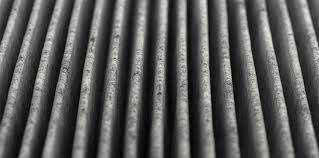Why Your Home's Filter Has Turned Black
January 28 2019

Quick answer: Soot, mold, and the severe build-up of debris are the three main reasons why your air filter may be turning black. However, even though you may think it’s not a big issue, it’s one that really needs to be fixed to prevent causing further damages to your entire HVAC unit.
Replacing your furnace filter is a vital part of ensuring that you’re keeping your HVAC unit in the best possible condition. Clean air filters are what enables the system to capture and remove pollutants, ensuring that the air within your home is as hygienic as possible.
However, even if you keep up with changing your air filters at least every three months, you may still be finding that your air filter is turning black. It’s normal for debris and dust to build up on your filter, which is the reason why it needs to be replaced often, but having filters constantly turn black can a very obvious indicator that there are bigger issues you need to address.
What Turns Home Filters Black?
If you find that your air filter is covered in a black coating, there are usually three main culprits. You need to identify why exactly your filter is turning black, and then you can put prevention plans in place.
Soot
If you tend to find yourself lighting candles in your home environment, they very well could be the cause of the black dust on your air filter. This is due to the fact that burning candles produces black soot, which then builds up on your air filter over time as your unit attempts to filter the soot out of the atmosphere. This means that excessively burning candles can, in turn, prevent your HVAC unit from working as efficiently as possible as the soot will block the filter from capturing other pollutants.
Generally, to prevent this, it’s a good idea to cut down on burning candles indoors. However, if you do insist on lighting candles, try to ensure that there’s no excess airflow around the candle itself to prevent the production of black soot. You can also go the extra step to ensure that you’re only purchasing soy candles instead of opting for candles made of petroleum jelly which give off more chemicals.
Mold
If you live in an especially humid climate, you could actually be dealing with the growth of mold on your HVAC unit’s air filter. This is generally a lot worse than the buildup of black soot because mold releases toxins that can cause big health issues. While it may be disrupting the efficiency of your HVAC unit, the bigger issue is that mold – especially black mold – can have major implications on your health, so it needs to be dealt with as soon as possible.
Mold growth is caused by condensation collecting on your air filtration unit’s evaporator core, which can sometimes mean that the moisture transfers into the air filter. As the unit continues to run, mold growth will be promoted, causing black mold to build up on the filter itself and result in a black coating.
If you do find that black mold is growing on your filter, the only way to properly deal with the issue is to replace your filters immediately. If you don’t, then your HVAC system will continue to attempt to circulate air through the dirty filter, resulting in mold spores being released into the atmosphere of your home. Leaving a moldy air filter can result in health issues ranging from asthma to respiratory problems, so it’s definitely not something to ignore.
Severe Debris Buildup
If you’ve ruled out black soot and black mold being the main issue, then it’s likely that your filter is actually severely clogged. This is due to the buildup of dirt and dust in the air filter itself as it attempts to remove as many pollutants as possible from the atmosphere within your home. In turn, the accumulation of this dirt is eventually going to cause your air filter to become fully blocked, preventing your HVAC unit from doing its job at all.
Generally, a blocked air filter is fairly easy to deal with. Having a blocked filter is going to cause your unit to be unable to circulate the air within your home as the dirt will restrict the air flow. In turn, your unit will be unable to capture the pollutants and the air borne particles that it’s meant to be filtering out, so it won’t be effectively doing what you want it to.
To prevent the buildup of excess debris on your filter, it’s important to regularly change your air filters at least every three months. While three months is the maximum amount of time you should wait before changing air filters, you may find that you need to replace them more often depending on the circumstances of your environment.
If you find that your air filter is turning black, you need to dispose of it, replace it with a clean one, and identify the reason why. Whether it’s due to black soot or the simple buildup of dirt, a black filter still shouldn’t be ignored and can seriously damage the health of your overall HVAC unit if the issue is left untreated.
